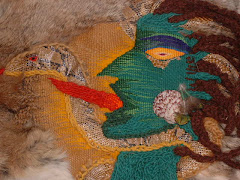Conscious Dying:
Would You Want to Remain Alert?
The other day Nan, the head of hospice on the island where I live, called me. “Can you come to the hospital and sit for a couple of hours with a ninety-year-old man who’s actively dying? He doesn’t have any family. One of the nurses called me.”
“Sure,” I said. “The nurse asked?”
“Yeah,” Nan laughed. Normally it will be the family who requests hospice. But that’s the beauty of living in a small community, and a nurse who cared enough to make a call, and hospice volunteers who don’t always act on formalities.
When I entered Alex’s hospital room, a good-looking man in his forties, wearing a baseball cap, greeted me. Nan had told me I might run into Alex’s Power of Attorney, Dave. I introduced myself and we shook hands. All smiles, he launched right in to telling me about his relationship to Alex, how Alex had showed up to mentor him when Dave’s parents had died, leaving him an orphan in his mid teens. He looked over at Alex. “I think he hears us, don’t you…talking about him. It’s perking him up, don’t you think?”
“I sure do,” I said, and made eye contact with the doctor, a friend of mine, who happened to be in the room when I arrived. My doctor friend stayed for a while to listen to Dave’s stories. I might as well have been in Alex’s home, with family members all around instead of hospital staff. That’s how friendly and comfortable the atmosphere was. Then Dave had to get back to work. As he was heading out the door, I asked him, “Have you had a chance to say ‘good-bye’ to him?”
Dave’s eyes welled up and he quickly looked away. “I don’t believe in that,” he said. “I don’t believe in that,” he said again, then turned and hurried out.
I sat down in a chair next Alex’s bed, and next to a machine on a pole, apparently monitoring him and delivering an intravenous supply of something, which I supposed was the morphine drip, and probably hydration, too. Alex had an oxygen mask over his nose. The machine buzzed and clicked and gurgled, and the needle on a dial swung back and forth. Alex’s skin was gray, mouth wide open, breathing deeply, erratically, chest rising and falling in huge effort. Not a limb, or an eyelid, or other part of him moved during the two hours I was there. The morphine drip must have kept him pain free, but he was otherwise unresponsive.
I’ve done this sitting in the hospital with the dying before, for the ones who don’t have family near, and who don’t have many hours to live, and have been put on a morphine drip. Sometimes I sing softly, and often feel a slight energy shift from corpse-like to life. However, I felt no response, energetically or physically, from Alex when I touched him gently on his arm, or when I chanted in a low voice. But then, towards the end of my time, when a nurse’s aide came in and gently massaged his forehead, I felt an infinitesimal change in his energy, like a breeze on a butterfly wing.
A friend of mine told me about a time when she went with the hospice singers, invited to perform for two patients in a hospital in a nearby town. The group of about eight gathered to sing for the first patient, a woman on a morphine drip, lying alone, gray and corpse-like, as Alex had been. The room smelled of sterilizers and machines, felt empty and hollow, looked dingy and worn. No friends, no relatives, no hospital staff were present. The woman, mouth hanging open, erratic breathing, gave no indication she was aware of the singers, but I suspect some far away part of her heard the song.
Then the music group moved on, a few doors down the hall to sing for Janet, a woman in her early sixties who was dying of cervical cancer. Janet had elected not to go through the stress of chemotherapy, and had decided to stop eating when it was clear her end was near. Before she knew about her terminal illness, she had joined one of the many groups that had formed in the area, studying and going through all the exercises in Steven Levine’s book, A Year to Live. She had wanted to experience a conscious death.
Janet’s husband, her daughter, and a couple of friends were there when the hospice singers arrived. A stunning afghan of bright colored squares, knitted and sewn together by bereft women friends, lay across her bed. Awake and alert, eyes bright, with no tubes or respirators, and only minimal pain medication, Janet nodded, frowning, when the lead singer asked what Janet would like to hear.
“No angels, no mush,” said Janet.
A challenging request, but the group came up with three pieces from their repertoire that qualified. Janet’s husband lowered her bed from sitting up position to reclining; then she closed her eyes and folded her hands over her chest. My musical friend reported that while they were singing, angels filled the room, hovering, bright and luminous.
When the room settled into silence after the last song, Janet opened her eyes and smiled. “I’d like you to come again,” she said. And they did, a week and a half later, to sing at Janet’s memorial service. Janet had died two days after the hospice sing.
I spoke with another of Janet’s friends who’d visited her in the hospital; that friend had also had seen angels over Janet’s bed.
“Sure,” I said. “The nurse asked?”
“Yeah,” Nan laughed. Normally it will be the family who requests hospice. But that’s the beauty of living in a small community, and a nurse who cared enough to make a call, and hospice volunteers who don’t always act on formalities.
When I entered Alex’s hospital room, a good-looking man in his forties, wearing a baseball cap, greeted me. Nan had told me I might run into Alex’s Power of Attorney, Dave. I introduced myself and we shook hands. All smiles, he launched right in to telling me about his relationship to Alex, how Alex had showed up to mentor him when Dave’s parents had died, leaving him an orphan in his mid teens. He looked over at Alex. “I think he hears us, don’t you…talking about him. It’s perking him up, don’t you think?”
“I sure do,” I said, and made eye contact with the doctor, a friend of mine, who happened to be in the room when I arrived. My doctor friend stayed for a while to listen to Dave’s stories. I might as well have been in Alex’s home, with family members all around instead of hospital staff. That’s how friendly and comfortable the atmosphere was. Then Dave had to get back to work. As he was heading out the door, I asked him, “Have you had a chance to say ‘good-bye’ to him?”
Dave’s eyes welled up and he quickly looked away. “I don’t believe in that,” he said. “I don’t believe in that,” he said again, then turned and hurried out.
I sat down in a chair next Alex’s bed, and next to a machine on a pole, apparently monitoring him and delivering an intravenous supply of something, which I supposed was the morphine drip, and probably hydration, too. Alex had an oxygen mask over his nose. The machine buzzed and clicked and gurgled, and the needle on a dial swung back and forth. Alex’s skin was gray, mouth wide open, breathing deeply, erratically, chest rising and falling in huge effort. Not a limb, or an eyelid, or other part of him moved during the two hours I was there. The morphine drip must have kept him pain free, but he was otherwise unresponsive.
I’ve done this sitting in the hospital with the dying before, for the ones who don’t have family near, and who don’t have many hours to live, and have been put on a morphine drip. Sometimes I sing softly, and often feel a slight energy shift from corpse-like to life. However, I felt no response, energetically or physically, from Alex when I touched him gently on his arm, or when I chanted in a low voice. But then, towards the end of my time, when a nurse’s aide came in and gently massaged his forehead, I felt an infinitesimal change in his energy, like a breeze on a butterfly wing.
A friend of mine told me about a time when she went with the hospice singers, invited to perform for two patients in a hospital in a nearby town. The group of about eight gathered to sing for the first patient, a woman on a morphine drip, lying alone, gray and corpse-like, as Alex had been. The room smelled of sterilizers and machines, felt empty and hollow, looked dingy and worn. No friends, no relatives, no hospital staff were present. The woman, mouth hanging open, erratic breathing, gave no indication she was aware of the singers, but I suspect some far away part of her heard the song.
Then the music group moved on, a few doors down the hall to sing for Janet, a woman in her early sixties who was dying of cervical cancer. Janet had elected not to go through the stress of chemotherapy, and had decided to stop eating when it was clear her end was near. Before she knew about her terminal illness, she had joined one of the many groups that had formed in the area, studying and going through all the exercises in Steven Levine’s book, A Year to Live. She had wanted to experience a conscious death.
Janet’s husband, her daughter, and a couple of friends were there when the hospice singers arrived. A stunning afghan of bright colored squares, knitted and sewn together by bereft women friends, lay across her bed. Awake and alert, eyes bright, with no tubes or respirators, and only minimal pain medication, Janet nodded, frowning, when the lead singer asked what Janet would like to hear.
“No angels, no mush,” said Janet.
A challenging request, but the group came up with three pieces from their repertoire that qualified. Janet’s husband lowered her bed from sitting up position to reclining; then she closed her eyes and folded her hands over her chest. My musical friend reported that while they were singing, angels filled the room, hovering, bright and luminous.
When the room settled into silence after the last song, Janet opened her eyes and smiled. “I’d like you to come again,” she said. And they did, a week and a half later, to sing at Janet’s memorial service. Janet had died two days after the hospice sing.
I spoke with another of Janet’s friends who’d visited her in the hospital; that friend had also had seen angels over Janet’s bed.
Come, my beloved,
Let us go out into the fields
And sleep all night among the flowering henna.
Let us go early to the vineyards
To see if the vine has budded,
If the blossoms have opened
And the pomegranate is in flower.

Credits:
Poem: from "The Song of Songs"
Photos: freestockphotos.com/Sky.html








No comments:
Post a Comment